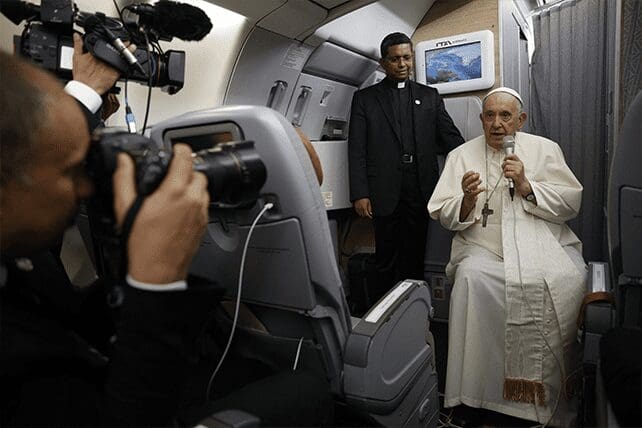ABOARD THE PAPAL PLANE (RNS) — On his return flight from a six-day “penitential pilgrimage” to apologize to the Indigenous people of Canada on Friday, Pope Francis spoke about his health struggles and what their implications might be for the future of his papacy.
“I don’t think I can continue going on trips with the same pace I had in the past. At my age and with my limitations, I need to save energy in order to serve the church,” the pope told reporters aboard the papal plane, while being seated for the first time during the traditional inflight press conference.
“On the other hand, I might need to think about the possibility of stepping aside. It wouldn’t be a catastrophe. The pope can change, that is not a problem,” he added.
Francis traveled throughout the vast country July 24-29, meeting with First Nations, Metis and Inuit communities in on their own lands. From Edmonton to Quebec City to the far-northern island city of Iqaluit, the pope embarked and disembarked the plane by using a lift and met with Indigenous people on his wheelchair.
Despite the obvious toll the trip had on the pontiff, he appeared lively and energetic during the press conference aboard the papal plane, addressing a wide range of issues. Speaking to journalists, the pope reflected on the pressing issues of his trip by condemning as “evil and unjust” the papal justification for colonialism in the past, enshrined through the Doctrine of Discovery. He described the forceful assimilation of Indigenous people and the attempted erasure of their culture as genocide.
“It’s a genocide,” Francis said, referring to the state and church led practice of “taking away children, changing the culture, the mentality and the conditions and a race” of Indigenous people. The pope said he apologized and condemned the role the church played in the administration of residential schools, which often forcibly removed children from their families and traditions.
The pope said the papal bulls that in the past provided a justification for the colonization and forceful conversion of Indigenous lands were “grievous” and suggested the Vatican is working to amend the Doctrine of Discovery. He encouraged “going back and fixing the wrong that was done” but underlined that colonization continues today in new forms of homogenization and extinction of local diversity.
As an example, Francis spoke about the persecution of Rohingya Muslims in Myanmar who “don’t have citizenship rights and are considered inferior.”
The papal trip to Canada focused especially on St. Anne, the grandmother of Jesus and a beloved figure in Catholic Indigenous communities. The pope underlined the important “role of women in the transmission and development of the faith.”
“The church is a woman. The church is a wife. The Church is not a man,” he said, adding that the vision of the church as a mother must prevail above any “macho power.”
As many women in the world fight for reproductive rights, Pope Francis weighed in on contraceptives, which were deemed “intrinsically wrong” by the church following Paul VI’s controversial 1968 encyclical Humanae Vitae, On Human Life, because they deny an openness to life.
“When dogma or morality develop it’s a good thing,” the pope said, before signaling some possibility of developing a revised Catholic doctrine on contraceptives, while insisting this must be done within the church and respecting tradition. “A church that doesn’t develop its thinking in an ecclesial sense is a church that goes backward,” he added.

